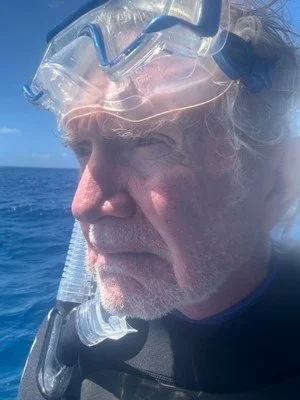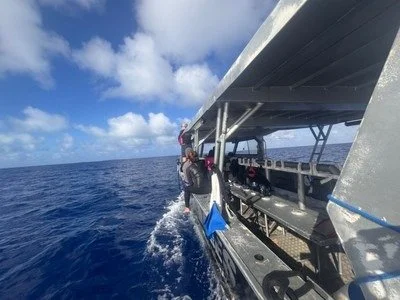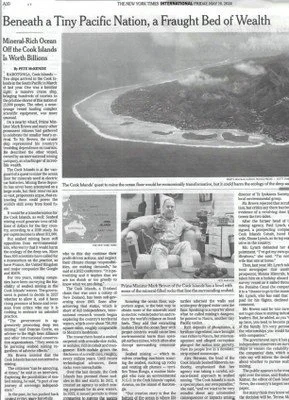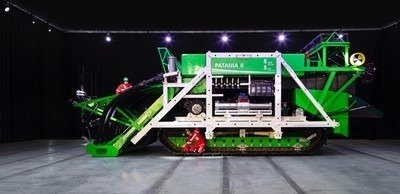Chapter 23: Two quests: one for humpbacks, one for riches
Mask, Fins, Snorkle, Seabed Crawling Machines?
How does a typical day go when you're on a humpback swim safari?
First, you head out of the harbor. You get into your swimwear--for me a "shortie" that goes over my trunks and a shirt called a rash guard. The shortie is only needed because the water is a bit cold. The way it works is that when you jump in the water seeps in between the rubber of the shortie and your skin. Your body heats that thin layer of water and that, along with the rubber of the suit, keeps your torso's heat from being leeched out of your body. You only need these when the water is cold. When the water is very cold, you wear a dry suit. It allows no water to your skin. If the water is cold enough that I need a dry suit, I don't go there.
Then, you look. You scan the horizon. You're looking for a spout--the column of mist that a humpback makes when it surfaces and then robustly exhales before it inhales. You can see a spout from far away. Sometimes, you see the massive splash of a breech. That is what happened here.
You make your way in that direction and wait to see what happens next.
If you're lucky, this happens: another breech but now closer. But, as you can see, it wasn't right in front of us where it should have been. The fact of the matter is that these creatures are on the move and you don't know what direction they may take. I had my camera trained where it should have been, not where it was.
You continue. If very lucky, this happens.
Now it is time for the captain to position the boat and Josh to offer up the command to slip into the water. "All right, all right, all right, alright..." That's the command. The adrenaline is pumping. Still, however, there is no guarantee that your quest will not have vanished.
And that is what happened to us this morning. In the water but with nothing to see.
So went the day. That which I came to see has eluded me once more. I have one more day and one more day only.
I am in a far off neighborhood. Other than the Cook Islands where I now am, who is around? Kiribati, the Republic of the Marshall Islands (RMI), Federated States of Micronesia (FSM), Republic of Nauru, Republic of Palau, Independent State of Samoa, Kingdom of Tonga, Tuvalu, and Vanuatu. One week ago, one thousand miles away, on Tonga, the Pacific Islands Forum was interrupted by a 6.9 magnitude earthquake and extraordinary heavy rains. Held in Nuku’alofa, Tonga, 1,500 delegates from 40 countries discussed long term planetary survival, both economic and environmental. The Secretary General of the United Nations, Antonio Guterres of Portugal, issued a global SOS – “Save Our Seas.”
Representing a relatively tiny number of people from the Pacific Islands and a much greater population from both Australia and New Zealand, forum participants agreed on one thing: humanity must act regarding climate change and its potential impact. What had previously gone relatively unnoticed is now front and center not only due to rising sea levels but also due to Chinese involvement with leaders of these far-flung island nations. While at once being a primary contributor to global warming the Chinese are also a big player in offering financial aid in the region in exchange for geographic presence and influence. We in the west ignore this part of the world at our peril.
From a completely different perspective, a May New York Times article caught my eye. There is impending trouble in paradise. "Beneath a Tiny Pacific Nation, a Fraught Bed of Wealth" The headline teased with the tagline: "Mineral-Rich Ocean Off the Cook Islands Is Worth Billions."
The Cook Islands is a nation of 15,000 citizens, give or take a few. The economy depends primarily upon tourism. Catering to the likes of me can be trying. Voting to allow foreign corporations to come and engage in seabed mining where rocks and sand are sucked up by crawling machines which scour the seabed could offer each of those folks more money than they could ever dream of by hosting nature lovers and adventure seekers like myself. It could also crush their dreams by turning their ecological paradise into something not unlike what happened to Nauru (2,600 miles northwest of here) now described as strip-mined desolation resembling the surface of the moon. Nauruans who dreamed of riches lost out to what many allege was bad management coupled with corruption and now live in poverty on an island, four-fifths of which is now uninhabitable due to phosphate mining.
Why is seabed mining a topic of conversation here?
It seems that the unique minerals required for the manufacture of electric car batteries lie on the ocean floor here in golfball to grapefruit sized rocks called polymetallic nodules. Cobalt and manganese and more (including rare earth metals) are the prize. Similar deposits exist in Japan and Norway but in quantities said to not be enough for what the emerging electric vehicle industry will undoubtedly require.
Does the planet have to sacrifice these islands in order to shift away from environmentally damaging fossil fuels?
For the people who live here on a per capita income estimated at around $11,000 USD annually, the lure is great. One billion divided by 15,000 is $66,667. If the estimates of "billions" is correct, one may need to multiply that by however many billions we are talking about. If you were offered four years pay all at once for doing nothing, would you do it? The public here is said to be evenly divided on the idea.
Environmentalists debate here, as they do everywhere, asking how many living things must die and how much natural beauty must be sacrificed for this bonanza. No tourists flock to Nauru. What Cook Islanders may have to do is trade one thing for another. Cook Islanders have been self-governing since 1965 when they 'separated' from New Zealand. This decision will test their democracy in many ways, dividing the people. Profiteers will abound. Will the Chinese be among them? Sound familiar?





